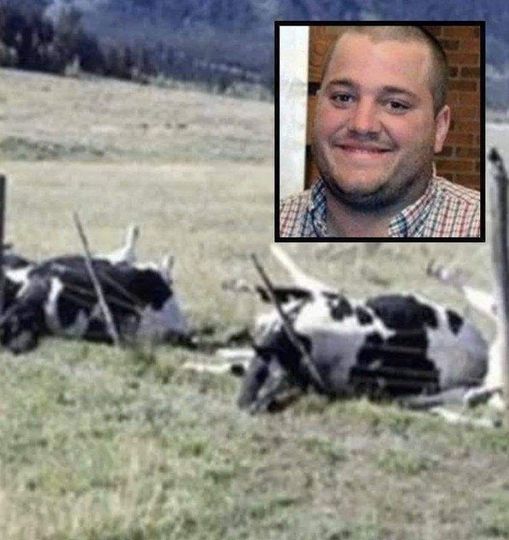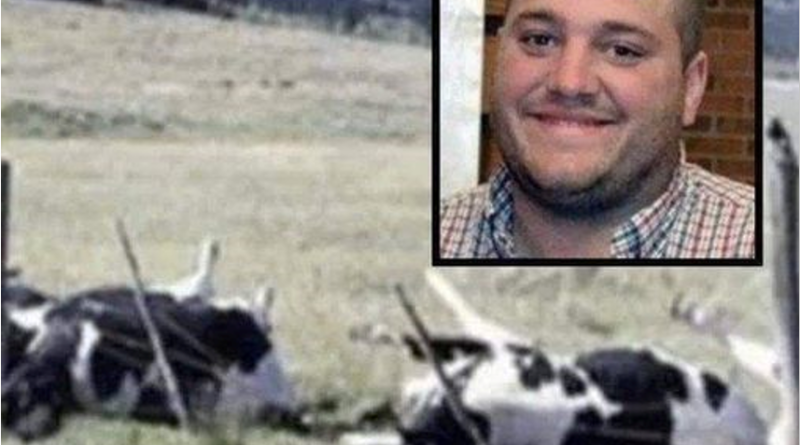Farmer And 16 Cows Found Dead, Cause Of Death Finally Discovered
Tragic Farm Accident Claims the Life of Wisconsin Farmer and Sixteen Cattle
In a devastating incident that has sent shockwaves through the farming community, 29-year-old Michael Biadasz tragically lost his life due to a deadly buildup of toxic gases on his family’s farm in Amherst, Wisconsin. Alongside him, sixteen of the farm’s cattle also perished in the accident, further deepening the loss felt by the Biadasz family and their community. This tragedy highlights the potentially lethal conditions that can arise in agricultural environments, particularly involving manure management systems.

The Formation of a “Deadly Dome”
The accident, which occurred in late August, was attributed to a dangerous buildup of gases over a manure holding tank on the Biadasz family farm. These gases—likely sulfur oxide or methane—are commonly produced during the decomposition of manure. Under normal conditions, these gases are released gradually into the atmosphere, posing minimal risk. However, on this tragic day, a unique combination of weather patterns created what experts have described as a “deadly dome of air.”
According to reports from WAOW, this dome formed when warm upper air temperatures trapped the gases close to the ground, creating a lethal layer of toxic air around the manure tank. This phenomenon, known as an inversion, prevented the gases from dissipating into the atmosphere, instead causing them to accumulate at dangerous levels.
Michael Biadasz, who was preparing to pump the manure tank, was unaware of the dangerous conditions surrounding him. As he began his work, he was quickly overwhelmed by the toxic vapors. The inhalation of these gases led to his sudden death, along with the deaths of thirteen cattle on the farm. Tragically, three more cattle succumbed to the fumes later, bringing the total loss of livestock to sixteen.
A Father’s Grief and Reflection
Michael’s father, Bob Biadasz, co-owner of Biadasz Farms, has spoken out about the tragedy, describing it as the result of a “perfect storm” of weather conditions and farm activities. In an emotional interview, Bob explained that the gases had likely been building up in the manure holding tank for some time. The combination of unusually warm air temperatures and the planned pumping of the tank created the ideal conditions for the gases to become trapped in a concentrated, deadly mass.
“The weather conditions were just right, or wrong, however you want to put it,” Bob said. “It was a warm morning, and the warm air trapped the gases. Unfortunately, it happened right when Michael was going out to pump the manure.”
The Dangers of Manure Gas
Manure management is a common and essential practice on farms, particularly those that house large numbers of livestock. As manure decomposes, it produces gases such as methane, ammonia, carbon dioxide, and hydrogen sulfide. These gases can be toxic to both humans and animals, especially in high concentrations. While farms typically implement ventilation systems and safety protocols to prevent hazardous buildup, certain environmental factors—such as temperature inversions—can make it difficult to predict when and where these gases will become dangerous.
The toxic gases released from manure pits and holding tanks pose a significant risk to those who work closely with them. Hydrogen sulfide, in particular, is known for its ability to incapacitate individuals almost instantly when inhaled in high concentrations. It can cause respiratory failure, leading to unconsciousness and death within minutes. Methane, while less immediately dangerous to human health, can displace oxygen in the air, leading to asphyxiation.
Unfortunately, these gases are often colorless and can be difficult to detect without specialized equipment. In Michael’s case, it is likely that he had no warning of the dangerous conditions that had formed around the manure holding tank that morning.

Community Mourns the Loss
The tragic loss of Michael Biadasz has left a deep void in his community. A dedicated and hardworking farmer, Michael was well-known and respected in the Amherst area. His death has sparked an outpouring of grief from friends, family, and fellow farmers. Many have shared their memories of Michael as a kind and generous individual who was passionate about his work and committed to the success of his family’s farm.
In the days following the accident, the farming community has come together to support the Biadasz family, both emotionally and practically. Fundraising efforts have been launched to help cover the costs associated with the loss of livestock and to provide financial assistance to the grieving family.
The Importance of Farm Safety
This tragedy has also served as a somber reminder of the importance of farm safety, particularly when it comes to managing manure systems. While many farms have protocols in place to mitigate the risks associated with manure gas exposure, accidents like the one that claimed Michael’s life demonstrate how unpredictable and dangerous these gases can be under certain conditions.
Experts urge farmers to take extra precautions when working around manure holding tanks and pits. Regular maintenance of ventilation systems, monitoring of gas levels, and the use of personal protective equipment (PPE) can all help reduce the risk of toxic gas exposure. Additionally, farmers are encouraged to stay informed about local weather patterns, particularly during warmer months when temperature inversions are more likely to occur.
Moving Forward
As the Biadasz family continues to mourn the loss of their son and the cattle that were such an integral part of their livelihood, the farming community remains united in their support. The tragic accident serves as a stark reminder of the dangers that farmers face daily and the need for continued vigilance when it comes to safety.
In Michael’s memory, his family hopes to raise awareness about the dangers of manure gas and prevent similar accidents from occurring in the future. Though nothing can bring Michael back, his legacy will live on through the love he shared with his family and the impact he had on those who knew him.
The agricultural community, while devastated by this loss, stands resilient, vowing to learn from this tragedy and improve safety standards for the future.
